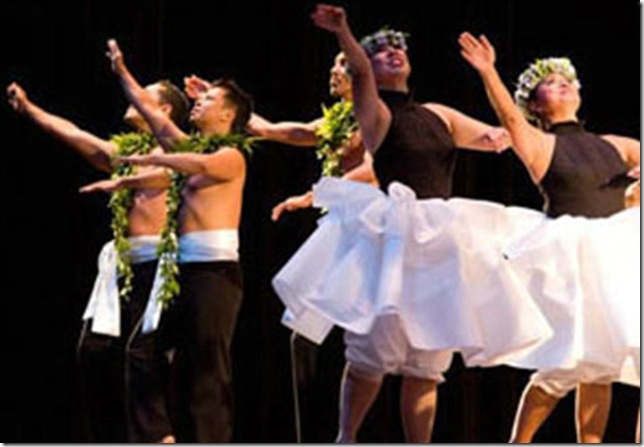First, get rid of any preconceived notions that you might have of Hawaiian dance and the hula. You won’t see any of that in this performance by Halau Hula Ka No’eau.
You will see a more historic and anthropological hula, one that was highly influenced by the missionaries and American and European culture. The women are covered from neck to ankle in granny-like Victorian muu-muus and the only grass skirts, which are so associated with the hula, are on the men.
In the interesting pre-performance lecture Friday night at the Duncan Theatre by artistic director and hula master Michael Pili Pang, with its slides and short excerpt of live performance in the lecture hall setting of Stage West, it was easy to appreciate the dance form’s importance anthropologically and how the company should be credited for helping to spore the cultural renaissance now happening in Hawaii.
But once onstage in the theater, even aided with this knowledge, copious program notes and the introductions before each piece by Pang, the absolute simplicity of the movement and the repetitiveness of same gestures that went on endlessly while depicting the lyrics of songs in a language one doesn’t understand was tedious.
The first half of the program presented the hula kahiko, the more classical depiction of the dance form. Much of it is ceremonial and performed seated to the sounds of percussive instruments and voice that the dancers perform themselves. It was not created as entertainment, as it was meant to be danced in front of an altar.
Things picked up a bit in the second half. There were some lovely images that were welcome but still long-winded. The saturated lighting design by Daniel Sakimura was satisfying and added an important dimension. These works were the more modern hula auwana, which literally means “to wander away.”
In Legends Told in a Church Basement, in a haunting image, a woman settled in a large puffed skirt, never standing, in humility to God, struggled with a flower lei moving first to traditional song and then to Ave Maria. It was quite beautiful as it conjured up images of a broken bird with clipped wings who could not leave her nest.
In Chance Encounter, which showed the conflict of cultures, the softly rhythmic, swaying hips of the line of women dressed in cool white, puffed organza skirts was juxtaposed with a barefoot couple, conspicuously dressed in heavy burgundy velvet, dancing together alternating between native steps and Western social dance steps.
Margaret’s Suite was created in homage to hula icon, Margaret Maiki Aiu Lake, Pang’s mentor and the revered mother of the Hawaiian Renaissance. In it, there was a welcomed moment when the lyrics (which finally we could understand as they were
in English) were softly mimed with gestures as three women performers slowly wandered across the stage dressed in black modest muu-muus and bejeweled in multiple vibrant pink leis.
Hâlau Hula Ka No’eau could be viewed as part of your dance education but on the other hand, in today’s fast-track techno culture, this is a hard ticket to sell as performance or entertainment even if it is part of yet another artistic and exciting dance season at the Duncan Theatre.
Here are the hard facts. The performance just didn’t sustain itself. It was long and slow. Maybe I am not on island time and can’t appreciate seeing the same movement done over and over again. I recognize and appreciate the restrictions that Pang explained they had in movement but the length of each piece was trying.
If the company wants its mission of taking “our culture from the past and move it into future” to work on general audiences, it needs some revamping. There needs to be some editing. Pang is great at leading us through the historical aspects. Perhaps the first half of the program should concentrate more on just being educational with narrated short excerpts of the different dance forms, thus setting up the audience for the second half of the program which is more appealing and varied.
In hindsight, I am glad that I saw Hâlau Hula Ka No’eau, but when I was there, not so much. I struggled about feeling that way. It was akin to eating your vegetables and knowing you will be better for having done it.
Hâlau Hula Ka No’eau can be seen again tonight at 8 at the Duncan Theatre, Palm Beach State College, Lake Worth. Tickets: $37. Call 868-3309 or visit www.duncantheatre.org.
